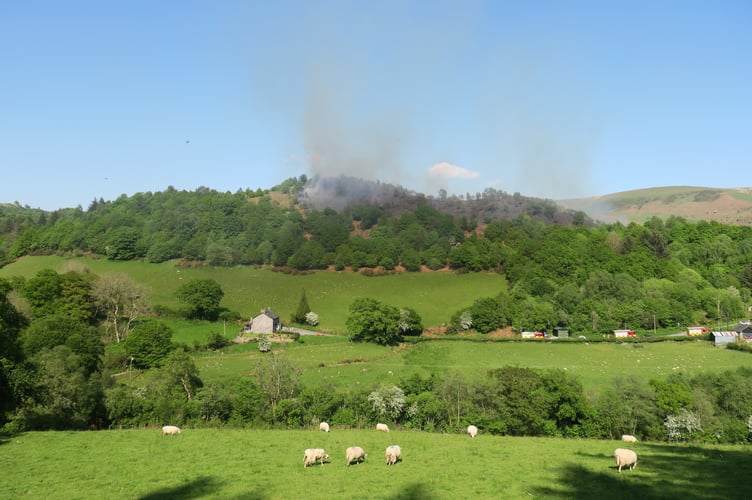FIRE crews had a busy weekend following a number of wild fires in the region.
At around 2.20pm on Saturday, eight appliances were sent to Aberangell to tackle a 10 acre gorse and bracken fire.
Crews from North Wales Fire and Rescue were on the scene until around 10pm on Saturday night and reattended on Sunday morning to inspect the scene.
Also on Saturday, three crews from across mid Wales were called to a wildfire near Machynlleth on Saturday afternoon.
The fire broke out at Glaspwll and crews from Mid and West Wales Fire and Rescue Service were called from Llanidloes, Machynlleth and Aberystwyth to tackle the blaze at around 4.35pm on Saturday, 20 May.
Approximately 15 hectares of gorse and bracken were well alight, with the fire being spread by strong winds.
Crews extinguished the fire using fogging units, beaters and knapsack sprayers, leaving the scene at 6.42pm.
North Wales and Mid and West Wales Fire service have reiterated safety calls to cut down on the number of wildfires.

Operation Dawns Glaw, a multi-agency task force of specialists from key agencies across Wales has reformed to reduce, and where possible eliminate the impact of grass fires across Wales.
The task force, which was initially established in 2016 by the all Wales Strategic Arson Reduction Board to tackle incidents of deliberately set grass fires across Wales, will also be turning its attention to the increase in accidental fires, often caused by our own careless behaviour when out enjoying the countryside.
In 2022 the fire services across Wales attended 3,269 grassfire incidents – this was an increase of 62% on the previous year with deliberate grass fires increasing by 1542 (47%) to 2263. The increase was mainly due to hot dry weather in July and Aug which resulted in a second spike of incidents in addition to the Mar/Apr activity.

Every year fire is responsible for the destruction of thousands of hectares of countryside, open space, and wildlife habitats. We want to work with our communities to build a healthier and more resilient countryside and to develop a more biodiverse countryside for the future. Working with our communities and sharing our knowledge provides us with a better understanding of what we can do to limit the damage that accidental fires cause to our environment.
Peter Greenslade, Corporate Head of Prevention and Protection for Mid and West Wales Fire and Rescue Service, and Chair of Operation Dawns Glaw, said: “As with previous years, we launch our Operation Dawns Glaw campaign as the weather starts to improve, the nights become lighter and our use of the landscape, countryside and grassland of Wales begins to increase.
“It is vitally important that we all continue to work together to build a healthier, more resilient and increasingly biodiverse landscape here in Wales, doing what we can to protect this precious resource for the future.
“We want to work with our communities, farmers, and landowners to share our knowledge and understanding of the effect that both deliberate and accidental fires have on our communities. We understand that controlled burns can have a positive effect on the environment, creating biodiversity and a sustainable ecosystem and we are available for free advice on how to do this safely.
“I would also like to take the opportunity to reinforce our messages that while accidents can happen, there are some within our communities who are deliberately setting fire to our countryside – not only is this a crime, for which they will be prosecuted, but it also places unnecessary pressure on front line services and puts our communities in harm’s way. I would encourage anyone with information relating to such crimes to call 101, or to report anonymously to CrimeStoppers on 0800 555 111”.
The operation is also continuing its work with farmers and landowners across Wales, reminding them that while they may burn heather, grass, bracken and gorse up until the 15 March (up to 31 March in Upland areas), they must have a Burn Plan in place to ensure they are burning safely. It is against the law to burn outside of the burning season and can result in penalties of up to £1000.





Comments
This article has no comments yet. Be the first to leave a comment.